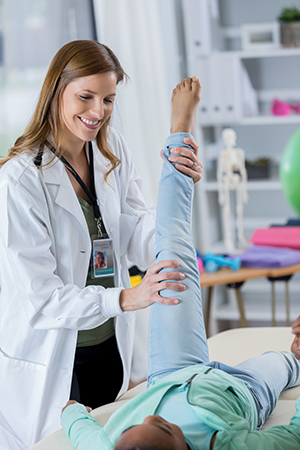The Pediatrics Orthopedic Team
Who treats pediatric orthopedic conditions?

Orthopedic conditions may be treated by your child's healthcare provider and/or other medical specialists. Several doctors from different medical specialties may be involved in the treatment of one child at the same time. This multidisciplinary team approach is particularly important in managing the symptoms of an orthopedic condition, especially as many symptoms are chronic and change in severity over time. Some of the more common medical professionals involved in the treatment of pediatric orthopedic conditions may include:
Pediatrician or primary care doctor
While your pediatrician or primary care doctor may treat and diagnose your child's disease, he or she may refer you to a specialist for more specialized treatment of certain aspects of the disease.
Orthopedic surgeon
The doctor who specializes in orthopedic surgery is called an orthopedic surgeon, or sometimes, simply, an orthopedist. Orthopedists are educated in the workings of the musculoskeletal system. This includes diagnosing a condition or disorder, identifying and treating an injury, providing rehabilitation, or helping prevent further damage to the musculoskeletal system.
The orthopedist may have completed up to 14 years of formal education. After becoming licensed to practice medicine, the orthopedic surgeon may become board-certified by passing both oral and written exams given by the American Board of Orthopaedic Surgery.
Many orthopedic surgeons choose to practice general orthopedics, while others specialize in certain areas of the body (for example, foot, hand, shoulder, spine, hip, or knee), or in a specialized area of orthopedic care (such as sports medicine, trauma medicine). Some orthopedists may specialize in several areas and may collaborate with other specialists, such as neurosurgeons or rheumatologists, in caring for patients.
Rheumatologist
A rheumatologist is a doctor who specializes in the treatment of arthritis and other rheumatic diseases that may affect joints, muscles, bones, skin, and other tissues. Most rheumatologists have a background in internal medicine or pediatrics and have additional training in the field of rheumatology. Rheumatologists are specially trained to identify many types of rheumatic diseases in their earliest stages, including arthritis, many types of autoimmune diseases, musculoskeletal pain, disorders of the musculoskeletal system, and osteoporosis. In addition to 4 years of medical school and 3 years of specialized training in internal medicine or pediatrics, a rheumatologist has had an additional 2 or 3 years of specialized training in the field of rheumatology. A rheumatologist may also be board-certified by the American Board of Internal Medicine or the American Board of Pediatrics.
Physical therapist
Physical therapy is the health profession that focuses on the neuromuscular, musculoskeletal, and cardiopulmonary systems of the human body, as these systems relate to human motion and function.
Physical therapists, or PTs, are very important members of the healthcare team. They evaluate and provide treatment for children with health problems resulting from injury, disease, or overuse of muscles or tendons.
Physical therapists have an undergraduate degree in physical therapy, and many have a master's or doctorate degree. To practice, all graduates must be licensed by their state by passing a national certification exam.
Physical therapists may practice in a variety of settings, including:
Hospitals
Rehabilitation centers
Home health agencies
Schools
Sports facilities
Community health centers
Private practice
As related to orthopedic conditions, physical therapists provide comprehensive treatment that includes:
Functional mobility
Balance and gait retraining
Soft-tissue mobilization
Body mechanics education
Wheelchair safety and management
Neuromuscular re-education
Exercise programming
Family education and training
Assistance with pain relief and management
Instruction in safe ambulation
Occupational therapist
Occupational therapy is a healthcare profession that uses "occupation," or purposeful activity, to help children with physical, developmental, or emotional disabilities lead independent, productive, and satisfying lives.
An occupational therapist often coordinates the following in the care for the person with a debilitating condition, such as an orthopedic condition:
Evaluating children with developmental, neuromuscular problems in order to plan treatment activities that will help them grow mentally, socially, and physically
Assisting children in learning how to carry out daily tasks
Conducting group or individual treatment to help children in a mental health center learn to cope with daily activities
Recommending changes in layout and design of the home or school to allow children with injuries or disabilities greater access and mobility
Occupational therapists work in a variety of different settings, including:
Hospitals
Rehabilitation centers
Schools
Home care agencies
Private practice
Government agencies
Physiatrist
Physical medicine and rehabilitation (PM&R), also known as physiatry, is a medical specialty that involves the process of restoring lost abilities for a person who has been disabled as a result of disease, disorder, or injury. Physiatry provides integrated, multidisciplinary care aimed at recovery for the whole person — by addressing the person's physical, psychological, medical, vocational, and social needs. The doctor who specializes in physical medicine and rehabilitation is called a physiatrist. Physiatrists are board certified by the American Board of Physical Medicine and Rehabilitation.
Podiatrist
A podiatrist specializes in foot care and is licensed to prescribe medicine and is allowed to perform some surgery.
Nurses/nurse practitioners
Nurse practitioners specialized in the care of orthopedic conditions may assist your child's doctor in providing care. In addition, these nurses will help you to understand your child's treatment plan and can answer many of your questions.
Depending on the specific condition involved, other doctors and healthcare professionals may be involved in treating orthopedic conditions. For example, a neurologist or neurosurgeon may assist in treating problems involving the spine because of involvement of the spinal cord.
Connect with us:
Download our App: